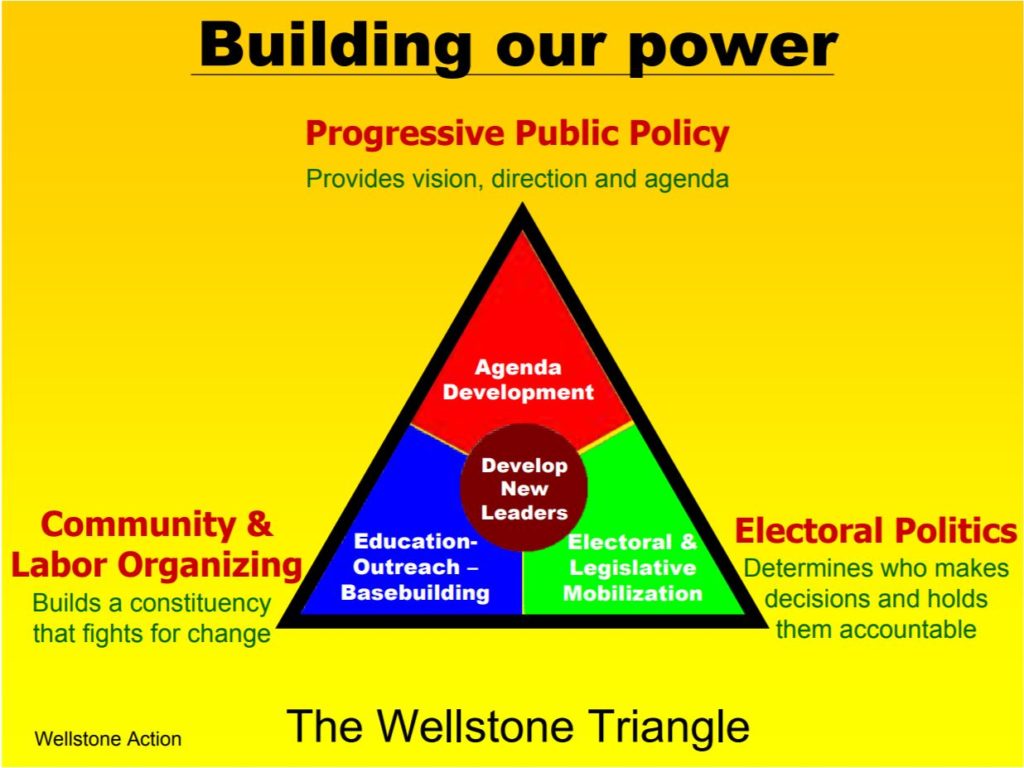How to Recruit Candidates to Run for Office
Why recruit candidates?
Community organizing is about building enough power to win tangible improvements in people’s lives and bring about a more just and sustainable society. There are three important components in bringing about change: good public policy, community organizing, and grassroots electoral campaigns. The late U.S. Senator Paul Wellstone said:
“Electoral politics without community organizing is a politics without a base. And community organizing without grassroots electoral politics is a marginal politics. And electoral politics and community organizing without good progressive policy is a politics without a head – without a goal.”
We agree. Community organizations can have the best public policy idea and the strongest grassroots organization and still lose their campaigns because the elected official in question is completely unwilling to make the right decision. In those instances, it is time to replace the elected official with someone more responsive to our concerns – hopefully someone that comes from our own ranks and is accountable to local citizens
Our theory of social change also recognizes that community organizations do not become truly powerful unless they have built and exercise electoral power. This means the ability to replace elected officials who routinely act against community interests. It also means the ability to get accountable community leaders elected to public office at all levels of government. Only then will we truly re-make society.
Who can recruit candidates?
Federal and state laws heavily regulate political activity. It is important to know the rules in your jurisdiction before you get started. Be sure to check the resources for more information section for help.
Individuals acting on their own behalf and on their own time are always free to get involved in politics, including recruiting someone to run for public office and helping in the campaign. This is true even if you work for a non-profit or other organization whose political activity is regulated.
Organizational political work is allowed in certain situations. If your organization is a 501(c)(4) social welfare/advocacy organization, a labor union, a trade association, or a political action committee, it can freely recruit someone to run for public office and support his or her campaign.
Non-profit organizations that have a 501(c)(3)charitable/educational tax-designation from the IRS are prohibited from engaging in partisan political activity, including recruiting candidates.
Employees and leaders of these organizations are allowed to freely support political campaigns using vacation time or after work. But leaders and staff need to be careful not to use the resources of the group to support a candidate or campaign.
Please note: running for the board of a non-profit association, like your local Rural Electric Cooperative, isn’t considered running for public office and your 501(c)(3) organization can get involved in those elections.
Prioritizing races for which to recruit someone
One of the first decisions your organization needs to make before diving head-first into candidate recruitment is for which offices are you recruiting candidates, and why? This question should be answered with an eye toward your organization’s strategic interests: there is not much point in going all-out to support a leader who is running for state legislator if your group focuses all of its work at the city council level. You should always ask yourselves which offices are most important to you and why.
Once you’ve decided which races are important, most organizations look to recruit candidates for “open” seats (where there is no incumbent due to a retirement or term limits) first. This is because the public debate over who to elect to an open seat is a lot different than running against an incumbent. A very large majority of incumbents are re-elected each year. The question voters often ask themselves in an open seat race is “who do I trust more to represent my interests?” In a race with an incumbent the election often focuses on the incumbent’s record and whether or not he/she should be “fired” and replaced with someone new.
Organizations also often review other strategic criteria when deciding where to recruit candidates, such as whether winning a particular race will result in significant change on the issues important to them.
For example, let’s say your organization has the choice between working in City A’s city council’s race and City B’s city council race. You might first recruit someone to run in City B because adding one more City B council member who supports your proposed ordinance on watershed protection means it could pass next year. However, in City A, 10 of the 12 city council members oppose your proposed ordinance, so adding one more voice of support on that elected body has less impact.
Qualities of a good candidate
Once you know where to recruit, it’s time to talk about whom to recruit. The first order of business is to make a list of bottom-line issues that your organization feels very strongly and passionately about. You should keep this list front-and-center during the recruitment process because it makes no sense to recruit someone to run for office that disagrees with you on these critical issues.
You should know this ahead of time, if possible, and will need to formalize your understanding of the candidate’s issue positions as the recruitment process moves forward. It may not be the first question you ask a potential candidate, but your organization should not get too far down the line in supporting anyone when you haven’t confirmed that he/she supports you on the key issues and will vote the correct way on those issues should the issues come before him/her once elected.
Where we find good candidates
The best place to find good candidates is to look inside your organization. Who are your strong, tested leaders? Who are the ones who are always helping organize actions, rallies, and other events?
Good candidates aren’t just active in your organization’s committees and chapters. They are active in their community, their PTA, church, or other local organizations. They may have just gotten an important community project accomplished, like the new library or open space bond. They have a large and strong social network. They need not be, but already may be involved in politics!
The best way to make a list of good candidates is to get together with other organizational leaders to begin brainstorming and assessing names. This candidate recruitment committee is a whole lot more likely to be successful by working together.
When you do meet, have the committee compare your notes on each potential candidate. Does the potential candidate live in a district that has a targeted seat up for election? What are the pro’s and con’s of that person running? If the potential candidate should not or could not run right now, make a list of what your organization can do to help groom this person—can anything be done to expand his/her network, build his/her exposure, and help him/her develop new skills?
At the end of this exercise, your group should prioritize whom to speak with first, second, and so on. Also decide who will speak with each potential candidate and when. Then be sure to follow-up. Make a plan to get the committee together for frequent check-ins when this process is occurring. It is often a good idea to have a short meeting or phone call after each potential candidate has been spoken with, but before moving on to the next person on the committee’s list.
Meeting with the potential candidate
The best potential candidates probably have never considered running for elected office. They will likely say “no” to a meeting with you if you lead with that request. You may wish to begin by saying that you are trying to find good candidates to run for office and would like to get their thoughts about names.
At this point it is important to make sure the potential candidate agrees with your organization on its critical issues (assuming your organization can get involved in the election). You should be up front about the fact that your organization is searching for candidates it can support who will be champions for your values and priorities. There is no point in proceeding further if the person who might run is not going to be with you when elected.
A good transition from a general discussion about names to the candidate herself might be, “Your name keeps coming up as someone who would be a good candidate. Have you ever thought about running yourself?” Most people will demure, but this is a good opener to the topic.
Another critical topic to broach is whether your potential candidate has the time and energy to devote to the race. Running for office is a large time commitment. While the saying goes that if you want something done, ask a busy person, it is important to make sure the potential candidate will prioritize the race. Other red flags include whether the candidate has a fear of asking for votes or asking for money – if these cannot be overcome the candidate will not be successful.
Assign homework and have a follow-up meeting
At the first initial meeting, it is a good idea to set-up a followup check-in meeting. In the interim, the candidate should be given some homework to see how serious he or she is about potentially running.
A good first task is for the candidate to make a list of 100 people in his or her district who will do more than just vote the right way. These 100 people will be the first 100 people who will be asked to volunteer or to donate money or both. If the candidate is not willing or able to complete this task in a reasonable amount of time, you should be concerned.
Other items for a second meeting could include: articulating in writing why the person wants to run, what the person wants to accomplish when elected, and talking about the level of support your organization could provide. It is also a good idea to brainstorm ideas about the campaign and discuss, in detail, the time, energy and resources it will take to win.
Preparing your candidate to run
After your candidate makes the “go/no go” decision, it is time to put a campaign team together and start training yourselves on how to run a good race. Many state political party organizations offer training for prospective candidates and campaign managers, so check with state headquarters.
Wellstone Action! trains progressives how to win issues and get elected to office. The Alliance for Justice has a wealth of materials for organizations on what they can and cannot do during an election year.
Great resources for further information
Wellstone Action! has materials on all aspects of grassroots electoral campaigns and holds exceptional trainings, www.wellstone.org.
Minute-long piece by Natural Resources Defense Council urging action on the proposed Keystone XL tar sands pipeline, www.youtube.com/watch?v=ZCNHcIx4gtU

Help create a healthy and sustainable West. Support WORC today.


